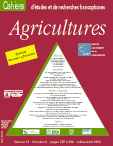Managing resources in large irrigated schemes of Africa: preventing conflicts and decentralizing in Mali
Keywords
agricultural policy, rural economy, farming system, west africa, central africaAbstract
The « Office du Niger » is one of the largest irrigation schemes in Sub-Saharan Africa. It was created in the first part of the twentieth century, under quite particular circumstances (colonization, populations moved from other regions or territories, settlers forced to stay, etc.). Despite successive political upholders (colonial, independent, civilian, military, democratic), its administration has until recently been characterized by coercive practices. The objectives were often focused on short-term production targets, ignoring support measures which could have insured long-term sustainability. People of diverse ethnic origins have been in charge of the construction and of the operation of the scheme. For decades, they have considered their stay at the Office du Niger as an opportunity for going elsewhere. Consequently, they cared little neither for obtaining more secure titles on land nor for appropriate natural resources management. But finally, after successive years of drought, increasing demographic growth, economic expansion and institutional and political change, the Office du Niger has gained a different and comparatively more attractive image. Today, the physical environment has changed strongly and so have the social and political conditions of life in the region. Different stakeholders are playing either complementary or, at the same time, conflicting roles. Traditional rules for sharing natural resources such as land, water, pastures and wood among different communities have found their limits. It is therefore necessary now to design new rules through negotiation between the different stakeholders, at different decision making levels, and to take into consideration the new political communities created by decentralization. In such conditions, if nothing is done, possible conflicts could quickly run out of hand. This paper sets down a diagnosis of the present, complex situation. It also draws up an outline for action-research, focusing on participatory approaches for the management of shared resources for rice farmers and cattle breeders, but also for all other stakeholders.Downloads
Published
2003-07-01
How to Cite
Coulibaly, Y. M. ., & Sangaré, Y. (2003). Managing resources in large irrigated schemes of Africa: preventing conflicts and decentralizing in Mali. Cahiers Agricultures, 12(4), 247–251 (1). Retrieved from https://revues.cirad.fr/index.php/cahiers-agricultures/article/view/30397
Issue
Section
Articles

